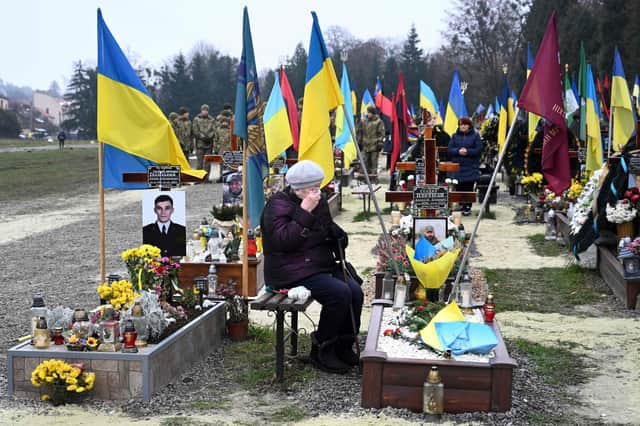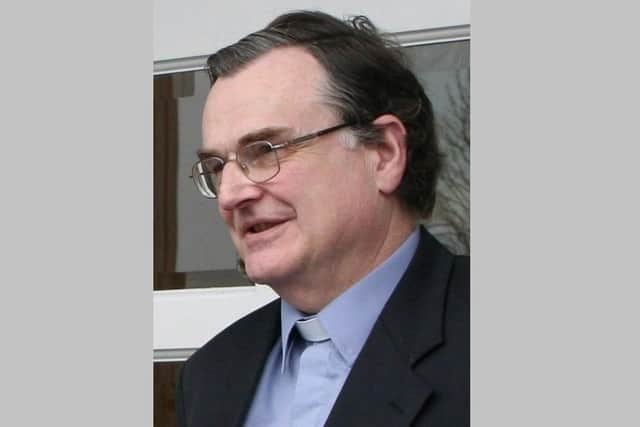Ian Ellis: Christmas will be an extremely poignant time for countless Ukrainians


She said: “We do hope that the approaching season of Christmas doesn’t make you forget about our tragedy and get used to our suffering." Christmas markets were held last December in Kiev's Kontraktova and Sofiivska Squares and other especially popular markets were held in Lviv, Kharkiv and Odesa.
The names of Ukraine's cities were not as familiar to us then, but now they are very familiar because of the tragic and deeply disturbing news coming from the country every single day. Here in Northern Ireland it is not unknown for there to be occasional power outages, but the supply is usually restored within a matter of hours.
Advertisement
Hide AdAdvertisement
Hide AdNot so in Ukraine, where everywhere there have been massive cuts in both electricity and water supplies as a result of the ruthless targeting of civilian infrastructure by Russia. We can certainly trust that, this year, Christmas will be celebrated in Ukraine to the very best of the resilient population's ability, but it will be nothing like last Christmas.


Indeed, there is a rich tradition of decorative arts in Ukraine, with Petrykivka paintings being especially renowned and coming into their own around Christmas time.
Then again, there are also traditional Ukrainian Christmas songs. The 'koliadky' are carols, characterised by the sense of deep joy they engender and by their distinctive melodies. Among the most popular is 'Nova radist stala' ('A New Joy Has Come').
Art and music and song all lie at the heart of the Christmas experience, pointing us to the deeper meaning of the season. Because Ukraine is a predominantly Orthodox country, the actual date of Christmas is not a straightforward subject.
Advertisement
Hide AdAdvertisement
Hide AdThe Orthodox follow a different church calendar from western Christianity, with Christmas Day falling on January 7. However, because of western influences, in 2017 Ukraine made December 25 a public holiday, in addition to the January date.
Now, the Orthodox Church of Ukraine (OCU), which is independent of the Russian Orthodox Church, is allowing the full religious celebration of Christmas on December 25. The OCU synod recently made the decision, taking into account the “numerous requests” and the discussion on the subject over past years in church circles and in wider society.
The OCU's Archbishop Yevstratiy told The Guardian newspaper that data would be collected this year to see how many worshippers attend services on December 25, which this year will fall on a Sunday.
The coming Christmas will be an extremely poignant time for countless Ukrainians who since last Christmas have lost loved ones, homes and livelihoods or who, themselves or their loved ones, have suffered in terrible ways.
Advertisement
Hide AdAdvertisement
Hide AdMillions have had to flee their country in search of security and will observe Christmas away from home, friends and family. Indeed, in recent days the general secretary of the Norwegian Refugee Council, Jan Egeland, has said of so many Ukrainians: “It is really a choice between freeze or fleeing.”
The First World War Christmas truces of 1914 were a remarkable phenomenon. Soldiers on both sides came out of their trenches and even played football together. It was not allowed to be repeated in following years as it was seen in certain quarters as a form on non-cooperation by soldiers in war – soldiers simply not wanting to fight.
On both sides soldiers felt they had much in common with their opponents. They were young men, often married with young families. They all had so much to live for. Nonetheless, Christmas, even in the midst of war, can bring a sense of hope and a certain relief from troubles, because the message of Christmas is the message of love and peace in people's hearts and for the world at large.
The rituals of Christmas are deeply ingrained and experiencing them and hearing their message again in the middle of a brutal conflict surely can be a source of deep comfort for those sorely afflicted.
Advertisement
Hide AdAdvertisement
Hide AdThe Imperial War Museums organisation has a film archive which includes films of how people celebrated Christmas during the Second World War both at home and on the fighting front. One of the films shows a London underground station full of people sitting together, with a Christmas tree being decorated by children and, later, families settling down under blankets for a night's sleep.
Another film shows some soldiers of the Eighth Army getting together for a Christmas dinner in 1943 around a makeshift table in the midst of the rubble in a ruined building in Tobruk, Libya. Both films show a truly indomitable spirit in the face of great adversity.
Whatever way we are celebrating Christmas it will be only right to heed Olena Zelenska's plea and to remember, and support however we can, those who are making do in whatever way they can in order to observe the worship and the much loved traditions of this time of year.
Not only that, but hopefully we can actually find inspiration to make our celebrations all the more meaningful by reflecting on how precious it all is, even, and perhaps especially, when there is suffering, loss, heartache and destruction all around.
Canon Ian Ellis is a former editor of The Church of Ireland Gazette.